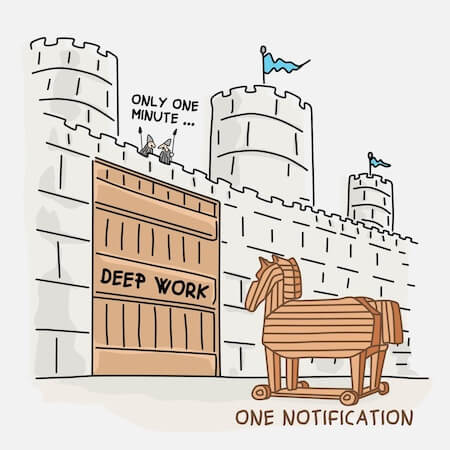
The number one tip I give to busy people who want more time to focus is to turn off their notifications.
The most pernicious of these are the email notifications that “pop out” from the top right-hand corner of your computer screen whenever you get a new email. If you are, at that moment, focussed on anything at all, these notifications cost you a loss of focus. Some studies note that it can take you up to twenty minutes to fully regain focus for deep work whenever you get a notification.
I recommend, then, that individuals and teams first turn off those screen notifications for emails, and then consider emails to be asynchronous, as that way they fall into the category of information to be considered, not urgent communications or tasks to be actioned right away.
I live this way myself. Send me an email and I may or may not read it right away, but I will only reply once I have taken time to consider it according to my list of priorities. So how do people get hold of me urgently or tell me there is something for me to urgently do, action or consider? Simple. There are other platforms of communication (eg phone, WhatsApp and more) that those who need to get hold of me can use to do so.
For more on this, including the wonderful term “Attention Residue” see this Linked In post from Sahil Bloom, which also gives credit to Roberto Ferraro for the wonderful artwork above. A picture can indeed say so much.
Oh, and why stop at emails? Here are a few more tips for other distractions (aka notifications):
- Have your phone on silent always
- (make sure to turn off the vibrate function too)
- Make the opening screen of your phone empty of all applications, so you consciously have to swipe right to see any apps
- Stop all (or all that you can handle, psychologically!) notifications from all apps on your phone, particularly those red dots on the app that let you know you have messages.
Once you’ve done all of that, you have to actively go into any app to see if you have any new messages or other notifications. After a short while, you may even discipline yourself to only do that when you have completed each piece of focussed, deep work.
Finally, you will only do any of this if you choose to. Notifications are designed to create a need to check them, something we humans have got used to very quickly in the smartphone age. We can, though unlearn any behaviour it if matters enough to us.
